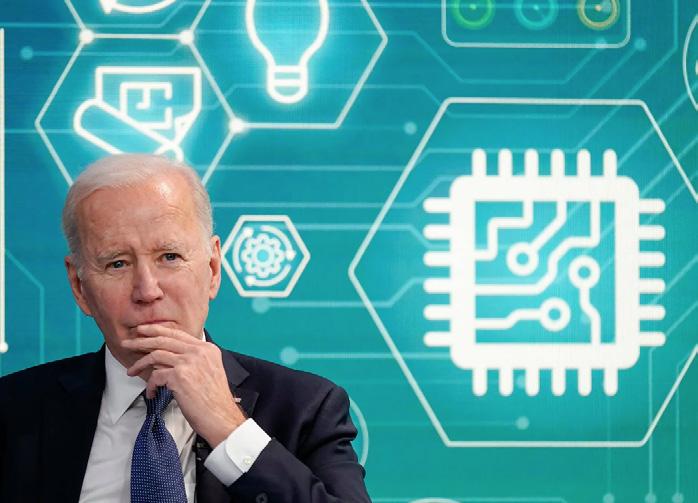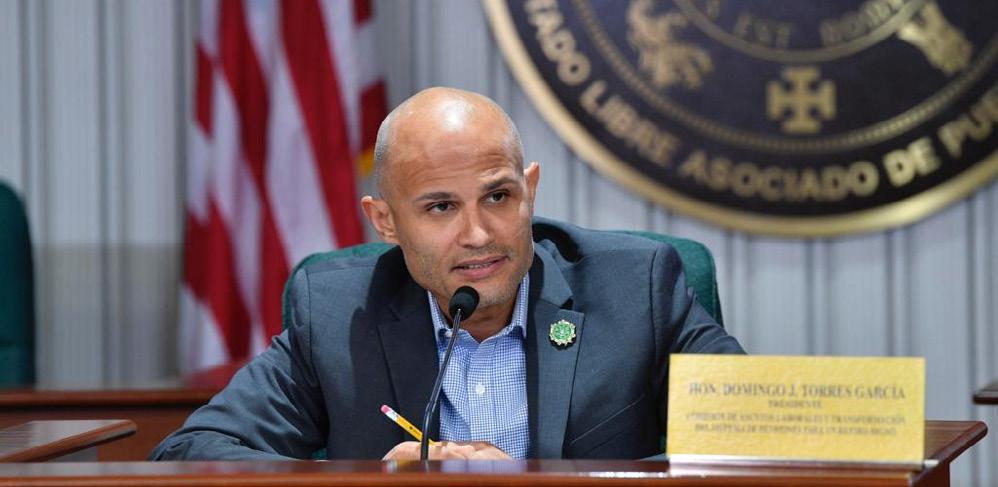
7 minute read
The cold war with China is changing everything
By DAVID BROOKS
So I guess we’re in a new cold war. Leaders of both parties have become China hawks. There are rumblings of war over Taiwan. Xi Jinping vows to dominate the century.
Advertisement
I can’t help wondering: What will this cold war look like? Will this one transform American society the way the last one did?
The first thing I notice about this cold war is that the arms race and the economics race are fused. A chief focus of the conflict so far has been microchips, the little gizmos that not only make your car and phone work, but also guide missiles and are necessary to train artificial intelligence systems. Whoever dominates chip manufacturing dominates the market as well as the battlefield.
Second, the geopolitics are different. As Chris Miller notes in his book “Chip War,” the microchip sector is dominated by a few highly successful businesses. More than 90% of the most advanced chips are made by one company in Taiwan. One Dutch company makes all the lithography machines that are required to build cutting-edge chips. Two Santa Clara, California, companies monopolize the design of graphic processing units, critical for running AI applications in data centers.
These choke points represent an intolerable situation for
China. If the West can block off China’s access to cuttingedge technology, then it can block off China. So China’s intention is to approach chip self-sufficiency. America’s intention is to become more chip self-sufficient than it is now and to create a global chip alliance that excludes China.
American foreign policy has been rapidly rearranged along these lines. Over the last two administrations, the United States has moved aggressively to block China from getting the software technology and equipment it needs to build the most advanced chips. The Biden administration is cutting off not just Chinese military companies, but all Chinese companies. This seems like a common-sense safeguard, but put another way, it’s kind of dramatic: Official U.S. policy is to make a nation of almost a billion and a half people poorer.
I’m even more amazed by how the new cold war is rearranging domestic politics. There have always been Americans, stretching back to Alexander Hamilton’s Report on Manufactures in 1791, who supported industrial policy — using government to strengthen private economic sectors. But this governing approach has generally been on the margins.
Now it is at the center of American politics, when it comes to both green technology and chips. Last year Congress passed the CHIPs Act, with $52 billions in grants, tax credits and other subsidies to encourage American chip production. That’s an industrial policy that would leave Hamilton gaping and applauding.
On the left are those who want to use industrial policy to serve progressive goals. The Biden administration has issued an incredible number of diktats for companies that receive CHIPs Act support. These diktats would force businesses to behave in ways that serve a number of extraneous progressive priorities — child care policy, increased unionization, environmental goals, racial justice, etc. Rather than being a program focused on boosting chips, it seeks to be everything all at once.
Telephones:
Over the next years and decades, China is going to pour immense amounts of money into its own industrial policy programs, across a range of cutting-edge technologies. One analyst from the Center for Strategic and International Studies estimates China already spends over 12 times as much of its gross domestic product on industrial programs as the United States does.
Over these coming years, U.S. leaders will have to figure out how effective that spending is and how to respond. Even more than the last cold war, this one will be waged by technological elites. Both sides are probably going to be spending lots of money on their most educated citizens — a dangerous situation in an age of populist resentments.
Already you can begin to see a new set of political fissures. In the center are the sort of neo-Hamiltonians who supported the CHIPs Act — including the Biden administration and the 17 non-Trumpy Republicans who voted with Democrats for the act in the Senate.
On the right, there are already a range of populists who are super-hawkish on China when it comes to military affairs but don’t believe in industrial policy. Why should we spend all that money on elites? What makes you think the government is smarter than the market?
One would hope that as the cold war atmosphere intensifies our politics will get more serious. When Americans went to the polls during the last cold war, they realized their vote could be a matter of life and death. It may feel like that again.
Governing during this era will require extraordinary levels of experienced statesmanship — running industrial programs that don’t become bloated, partially deglobalizing the economy without setting off trade wars, steadily outcompeting China without humiliating it. If China realizes it is falling further behind every year, then an invasion of Taiwan may be more imminent.
Miller was asked what were the odds that over the next five years a dangerous military clash between the United States and China would produce an economic crisis equivalent to the Great Depression. He put the odds at 20%.
That seems high enough to focus the mind.
Por El Star Staff
EL CAPITOLIO – El representante
Domingo J. Torres García, presidente de la Comisión de Asuntos Laborales, atendió el lunes, el Proyecto de la Cámara 1553, que busca ofrecer la alternativa a los empleados activos bajo Reforma 2000 y el Plan 106 de transferir voluntariamente su plan de aportaciones definidas a la Asociación de Empleados del Estado Libre Asociado (AEELA).
La medida busca enmendar la Ley 106-2017, según enmendada, conocida como “Ley para Garantizar el Pago a Nuestros Pensionados y Establecer un Nuevo Plan de Aportaciones Definidas para los Servidores Publicos”.
Durante el encuentro legislativo, la Junta de Retiro del Gobierno de Puerto Rico y la Autoridad de Asesoría Financiera y Agencia Fiscal de Puerto Rico (AAFAF) presentaron ponencias en contra de la pieza legislativa por

Por El Star Staff
considerar que es “inconsistente con el plan fiscal y con la reforma de pensiones”.
El director ejecutivo de la Junta de Retiro, Luis M. Collazo Rodríguez defendió el actual modelo que administra el Plan de Aportaciones Definidas de los servidores públicos.
Actualmente, la compañía Alight Solutions Caribe Inc. funge como entidad administradora del Plan 106.
“Por primera vez en la historia, el Sistema de Retiro logró crear un nuevo y verdadero Plan de Contribuciones Definidas después de los intentos fallidos del pasado con la Reforma 2000 y la Ley 3-2013, donde las cuentas individuales de los participantes nunca fueron creadas y el dinero aportado por los participantes no fue debidamente segregado y custodiado.
Hoy, los participantes de los sistemas de retiro han retomado el control de sus aportaciones y de su futuro, son ellos, no el Gobierno, los que deciden cómo y dónde invierten su dinero”, abundó Collazo Rodríguez.
Por su parte, el representante Torres García cuestionó a Collazo Rodríguez sobre el proceso competitivo que seleccionó a Alight Solutions Caribe Inc. “¿Cuánta experiencia tiene Alight en la administración de este tipo de planes?”, preguntó.
El deponente contestó que desde el 1990. Sin embargo, el legislador constató que la empresa seleccionada bajo el nombre Alight Solutions Caribe Inc. opera a partir del 2017. Collazo Rodríguez destacó que la empresa administradora sufrió en el 2017 un cambio de nombre. La entidad anteriormente estaba registrada bajo el nombre de Hewitt Associates Caribe, Inc.
SAN JUAN – La Asociación de Hospitales de Puerto Rico (AHPR), otorgó los “Premios Mujeres Destacadas en Salud 2023” a un grupo de profesionales cuya trayectoria y aportaciones han sido reconocidas en el país. El evento celebrado este fin de semana reunió a ejecutivos de los hospitales de Puerto Rico, quienes acompañaron al grupo de féminas seleccionado. La entrega de los reconocimientos estuvo a cargo de los licenciados Rafael Alvarado, presidente de la Junta de Directores de la Asociación de Hospitales de Puerto Rico, Jaime Plá Cortés, Presidente Ejecutivo de la Asociación junto a la Lcda. Marta Rivera Plaza (ex presidenta de la Junta de Directores de la Junta de Directores de la Asociación de Hospitales de Puerto Rico y CEO Sistema San Juan Capestrano).

“Las profesionales de la Salud que han sido seleccionadas para ser recipientes del “Premio Mujer Destacada en la Salud 2023 son: Dra. Carla P. Rodríguez Monserrate (FACC - Cardiología Centro Cardiovascular y del Caribe), Lcda. Mari Angeli Lago Barnecett (Especialista en HCC, Departamento de Salud de Puerto Rico), Lcda. Barbara Méndez Cabán (CFO Salud Correccional), la Dra. Ivonne Z. Jiménez Velázquez (CACP Catedrática de Medicina RCM –Universidad de Puerto Rico), la Dra. Dessie L. Vega Sorrentini (Directora Programas de Terapias Electro- convulsivas del Hospital San Juan Capestrano), la Dra. María Valentín Mari (Directora de Educación Médica Graduada Centro Médico Episcopal San Lucas) y la Dra. Carla P. Rodríguez Monserrate (FACC - Cardiología Centro Cardiovascular y del Caribe)”, informó el Lcdo. Rafael Alvarado Noriega (presidente de la Junta de Directores de la Asociación de Hospitales de Puerto Rico),
La presidenta del Comité Organizador de la actividad, licenciada Marta Rivera informó que esta es la séptima edición del evento en el cual se añadió una nueva categoría. La ex presidenta de la Junta de Directores de la AHPR dijo que se instituyó el “Premio Especial Ruby Rodríguez” en honor a la ejecutiva del mismo nombre quien falleció recientemente, habiéndose convertido en pilar fuerte de la institución. De igual forma Rivera Plaza informó que la Administración de Seguros de Salud de Puerto Rico (ASES) ofreció una charla sobre los fondos Medicare-Medicaid y la procuradora de la Oficina de Asuntos de la Mujer Vilmarie Rivera Sierra se dirigió a las homenajeadas con un mensaje alentador cónsono con el homenaje a las Mujeres Destacadas en la Salud.
“Este año estamos incorporando el “Premios Especial Ruby Rodríguez” en honor a nuestra compañera trabajadora incansable y quien falleció. El mismo es otorgado a la Lcda. Mari Angeli Lago Barnecett (Especialista en HCC, Departamento de Salud de Puerto Rico), que por su ejecutoria y dedicación es merecedora de este reconocimiento adicional que hemos institucionalizado”. La Lcda. Ruby Rodríguez fue una servidora pública de primera, habiendo ocupado varios cargos importantes en el gobierno, culminando su carrera profesional en la Asociación de Hospitales de Puerto Rico”, terminó diciendo el Lcdo. Jaime Plá Cortés, presidente ejecutivo de la Asociación de Hospitales de Puerto Rico.










